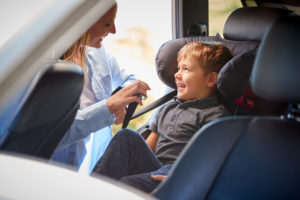Essential Questions to Ask About Child Car Safety
As a parent, protecting our children is the number one concern. We all want to ensure our children are safe and secure, whether at home, school or in a vehicle. It can be difficult sometimes to make sure we’re following the best rules for keeping our children safe in the car. Every hour, 150 children between the ages of 0 and 19 are treated in emergency rooms around the country for injuries sustained in auto accidents.

And, injuries from auto accidents are the leading cause of injury-related death for children between the ages of 5 and 19. We can’t protect our children every minute of every day from every threat. But, you can get a little peace of mind by understanding child car safety best practices. By adequately restraining children in moving vehicles, you can avoid any distractions that could lead to an accident.
What are the Laws in Florida for Child Car Safety?
In Florida, state laws for child car safety state that any child under 18 must be secured by a safety belt or safety seat. It is suggested that children ride only in the back seat until they are at least 12 years old because airbags are intended for adults and can be dangerous for children. Children under the age of 5 must ride in an approved child safety seat.
How Do I Choose the Best Safety Seat for My Child?
Check the specifications on the car seat and be sure to follow them closely. Be sure to choose a child safety seat designed specifically for your child’s age and weight. Child safety seats also have expiration dates. This is because the materials they are made of can become weaker over time. Be sure to check the expiration date and never use one that is expired.
Many communities offer free child safety seat checks at volunteer events, police and fire departments, or other civic community services. You can have your child’s seat checked for FREE at Tampa General Hospital. Just contact them to set up an appointment.
How Do I Properly Install a Child Safety Seat?
Proper installation of a child safety seat is critical to it serving its purpose by restraining your child in the event of an accident. It’s essential to know each part of the child seat and how they help keep your child safe. The NHTSA offers instructional videos for car seat installation as well as a search feature to find certified technicians who will inspect and install your child’s safety seat for free.
Do I Need to Replace My Child’s Safety Seat After a Crash?
It is essential never to use a second-hand car seat because you never know if it has been in a crash. Crashes can place strain on important parts of the car seat, leading to diminished strength, even if there are no visible problems with the seat. If you are involved in an auto accident, if you answer YES to any of the following questions, you will need to replace the car seat:
- Were you unable to drive the vehicle after the crash due to damage?
- Was anyone taken to the hospital after the crash?
- Did the airbags deploy?
- Is there any visible damage to the car seat?
If you answered NO to all of them, you might not need to replace the car seat. But, you should always contact the manufacturer after a crash, even if it was minor, to ask if it should be replaced. Or, it may be better safe than sorry and just replace it anyway.
Is it Safe to Leave a Child in a Car Unattended?
You should never leave a child in an unattended vehicle, even if only for a few minutes. This is especially true in hot weather. In 2018 alone, 53 children died due to heatstroke from being left in a hot vehicle. To combat the rising epidemic, Walmart and EvenFlo partnered up to create new car seat technology that will alert the driver to a child still buckled in the car when it is in park or if the buckle is unclipped while the vehicle is in drive.
At Darrigo and Diaz, we want to provide you with the knowledge and tools you need to drive safely on the roads and avoid accidents. But, sometimes, no matter how well you prepare, you can’t prevent someone else’s negligence. If you’ve been involved in an auto accident, we’re here to help you every step of the way. Contact us online or call (813) 774-3341 immediately for a confidential phone consultation.
